Wednesday, December 15th, marks the debut of David Liss and Francesco Francavilla’s new series titled Black Panther: The Man Without Fear! Recently the award winning author took some time out of his schedule to answer a few questions and shed some light on the new series.

Comic Attack: You’re known for your award winning historical thrillers, but for the comic fans who are unfamiliar, could you give us a bit about your background before coming to Marvel?
David Liss: I published my first novel, A Conspiracy of Paper, in 2000. I was a graduate student working on 18th century British literature, and essentially I turned my dissertation research into my my first book. Most of my novels are about some major event in economic history, and I’m genuinely interested in economic history, but I also believe that my first job is to tell good stories, so though my books deal with heavy topics, I try to make them exciting and funny and generally enjoyable. In fact, Marvel first contacted me because my editor, Bill Rosemann, said that the main character of my first novel reminded him of an 18th century Luke Cage. And I love writing that kind of character — street savvy, tough, uncompromising. At this point, I have six novels out, five of which are historical. I’ve also been writing some short horror fiction lately, and my next novel, due out next fall, will be my first full-length supernatural project.
CA: Who are some of the writers who influenced you in the past?
DL: For prose fiction, there are too many to name. I think i learn something from pretty much every book I read. That said, some big influences include Stephen King, Anthony Trollope, David Mitchell, Colin Harrison, Henry Fielding and Harry Crews.
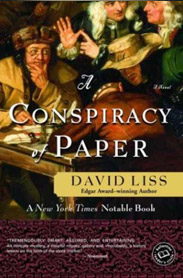 CA: I would assume that the creative process for writing novels and comics is entirely different. Was the collaborative aspect that goes into a comic difficult to adjust to?
CA: I would assume that the creative process for writing novels and comics is entirely different. Was the collaborative aspect that goes into a comic difficult to adjust to?
DL: Nothing was difficult to adjust to, except maybe all the deadlines. I love the collaborative process. After years of having everything depend on me, it was such a breath of fresh air to work with other people, and I couldn’t ask for better people on the team than Bill Rosemann and Francesco Francavilla. Bill is a fantastic editor. I don’t think I’ve ever worked with anyone who is better at his job than he is at his. I know there is a tremendous amount of love out there for Francsco’s art, and for damn good reason. So, working with people like this makes my part much easier. The issue you will hold in your hands is not simply the writer’s words with some pictures, it is a full collaborative effort between the writer, the artist and the editor, and while we all bring different things to the table, the final product reflects everyone’s influence. When I wrote my first script for Daring Mystery Comics, the collaborative process actually made everything easier, because I people to talk to to help me figure out precisely how a comic book script is generically unique.
CA: Your newest project for Marvel seems like a far cry from your usual subject matter. How did the opportunity to work on Black Panther: The Man Without Fear come about?
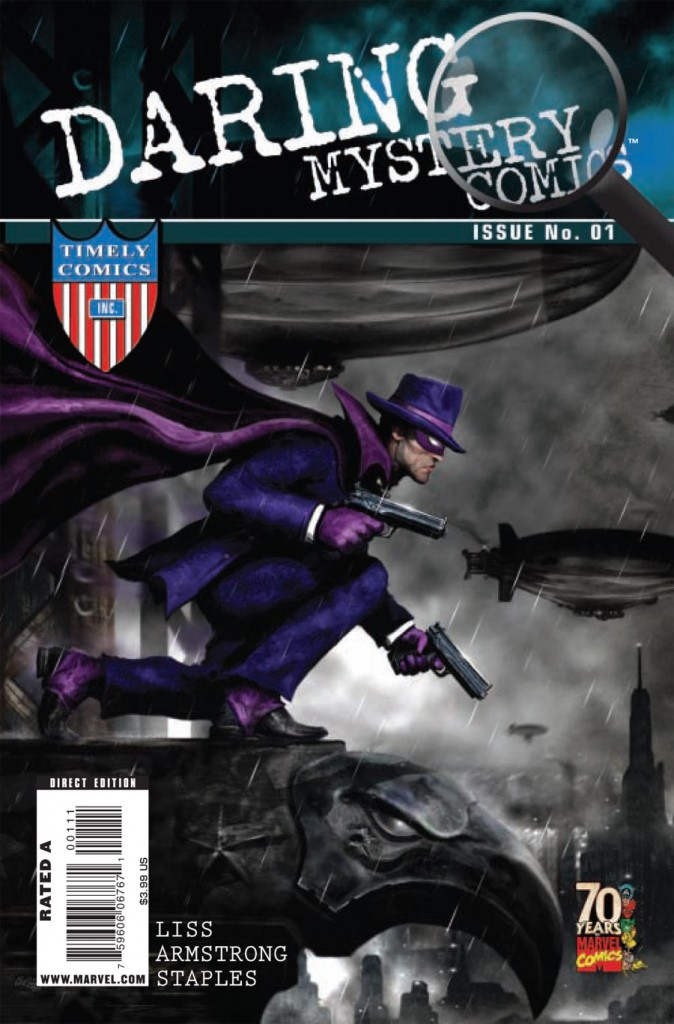
DL: Bill Rosemann, with whom I’ve worked before on Daring Mystery and another still-unannounced project, asked me to put together a pitch on the idea of Black Panther coming to Hell’s Kitchen. Everything was on a hectic schedule, and I got the word that I needed to start working on the first script right before I went on vacation with my extended family, so most of the first draft of that issue was written on a cruise ship. I’m enough of a workaholic that I loved sitting alone in the dining room late at night, drinking the endless supply of coffee, and hammering out a script.
CA: After everything was finalized between yourself and Marvel was there a lot of research to be done on your part or had you been keeping up with the character already?
DL: I’d been keeping up with Black Panther, in part because I’m friends with, and a fan of, Jonathan Maberry, but I went back and read a lot of Black Panther I hadn’t read before. I can tell you that researching a comic book character is a lot more fun than researching economic history.
CA: When the news broke that Daredevil was out and T’Challa was in as protector of Hell’s Kitchen, there was a mixed array of fan reactions. Were you prepared for the responses, and even the criticisms, about the project before it even hit shelves?
DL: I was already familiar with how, let us say, passionate some comics fans can be, and I fully expected there to be some detractors. Daredevil has many fans, and with good reason. I think he’s one of the most interesting characters in the Marvel universe, and he’s benefited from a legacy of some of the best writers in the biz. So I consider the grumbling about a shake-up like this to be par for the course. However, I know the people who sound off on the boards only reflect a fraction of the readers out there. I think many potential readers will have an open mind and want to see what we’re doing before they pass judgement. I suspect that many of the people complaining understand that if the Marvel universe is to remain a vibrant, dynamic place, things have to change, and those changes are exiting opportunities to tell new kinds of stories.
CA: T’Challa was basically a broken man during Hudlin and then Maberry’s run on Black Panther, then finally in DoomWar he’s desperate and going to extremes. Will your interpretation of T’Challa expand on that mindset of his, or will The Man Without Fear give us something else in T’Challa?
DL: I see T’Challa not as broken, but as damaged. Much about who he is has changed, and now he needs to come to terms with that and figure out what it means to be T’Challa when he is no longer Black Panther. So, while his skillset is greatly reduced and his powers diminished, he is in no way defeated. If anything, he welcomes the chance to prove himself and discover his true potential. This is not the end of the line for T’Challa, but the beginning of a new part of his life.
CA: There is a slight parallel in the recent deconstruction of both T’Challa and Daredevil, in both their personal lives as well as their superhero guises. Will this in any way influence a possible meeting between the two since T’Challa is now on DD’s turf?
DL: Beyond what you will see in the first issue, there are no immediate plans for such a meeting, as a fan, I’d love to see it, and as a writer, I’d love to write it, but no one has said anything to me about it.
CA: I was happy to hear you will be giving T’Challa a brand new villain in Vlad, and not just recycling DD’s rogues gallery. Was the introduction of a new villain on the table from the beginning, or did he come about later in the process?
DL: I wrote Vlad into my initial pitch. My feeling was that if I simply recycled Daredevil villains it would just be Daredevil with a different guy in a different costume, and if I recycled Black Panther villains it would be Black Panther in New York, which has certainly happened before. Introducing new villains and new supporting characters felt to me like the best way to establish that this is the new status quo. That said, I plan to bring in some of the Daredevil supporting characters over the course of this run, and I would love a chance to play around with Daredevil’s enemies, but doing so right out of the gate felt like the wrong move. If we’re going to convince fans that we’re doing something new, then we really have to, not just put old wine in new bottles.
CA: Are there any more new characters (heroes or villains) that will be introduced in Black Panther: The Man Without Fear that you can tease us with?
DL: I could, but I’d rather let the characters speak for themselves as they develop over the course of the first arc. Suffice to say that I hope to create interesting memorable characters in T’Challa’s orbit.
CA: How about already established characters; will we see any familiar faces?
DL: I think I anticipated this question, but the short answer is yes. I don’t want to make the book a parade of Daredevil regulars, but I also want to make it clear that the world Daredevil inhabited is a living, breathing place, and it is inevitable that the new guardian of Hell’s Kitchen will encounter people known to the old guardian.
CA: I commented in my article that Black Panther has potential, but has only been great in small spurts. What is your take on the character and the mishaps concerning his developments over the years?
DL: I think the biggest challenge Black Panther writers have faced in the past is dealing with Wakandan culture and politics. It is hard to make readers genuinely care about a fictional state and its own internal politics. It can be done, certainly, but it’s tricky in general, and even more so in a superhero comic. I suspect that’s why Black Panther has spent so much time in New York. One of the things I loved about the concept of this book is that it takes a great character, hamstrings him, puts him in the stomping grounds of one of the most interesting heroes in the Marvel U, and gives him a chance to show what he’s got. I’m not going to comment on past runs, but I do think this run is a chance to attract the attention of readers who may never have thought they cared about Black Panther. Certainly, he is now a character I love to read and write about — a person who has a lot to prove even though the odds are against him.
CA: Will T’Challa’s relocation put him at odds with Wakanda, or his sister and her role as the new Black Panther at some point?
DL: Who can say what the future holds? Not me.
CA: Which of your own books do you think would make for a great mini-series or graphic novel adaptation?
DL: Honestly, I tend not to think too much about adaptation. I wrote my books as novels, and that’s what they are. I suppose they could be adapted, but I’d much rather write an original series or graphic novel than attempt to take something I’ve written in one medium and try to translate it into another. Several of my novels are in development as film projects right now, and I know one of the most difficult barriers the screenwriters face is how to turn elements of the stories that are inherently verbal and render them visual. Sometimes it can be done easily, but other times it can be very difficult. I’m glad I don’t have to figure out how to do it myself.
CA: Do you have any other projects of your own or with Marvel lined up for the future that you can talk about?
DL: Not that I can talk about, but in the months to come you will learn about something extra cool.
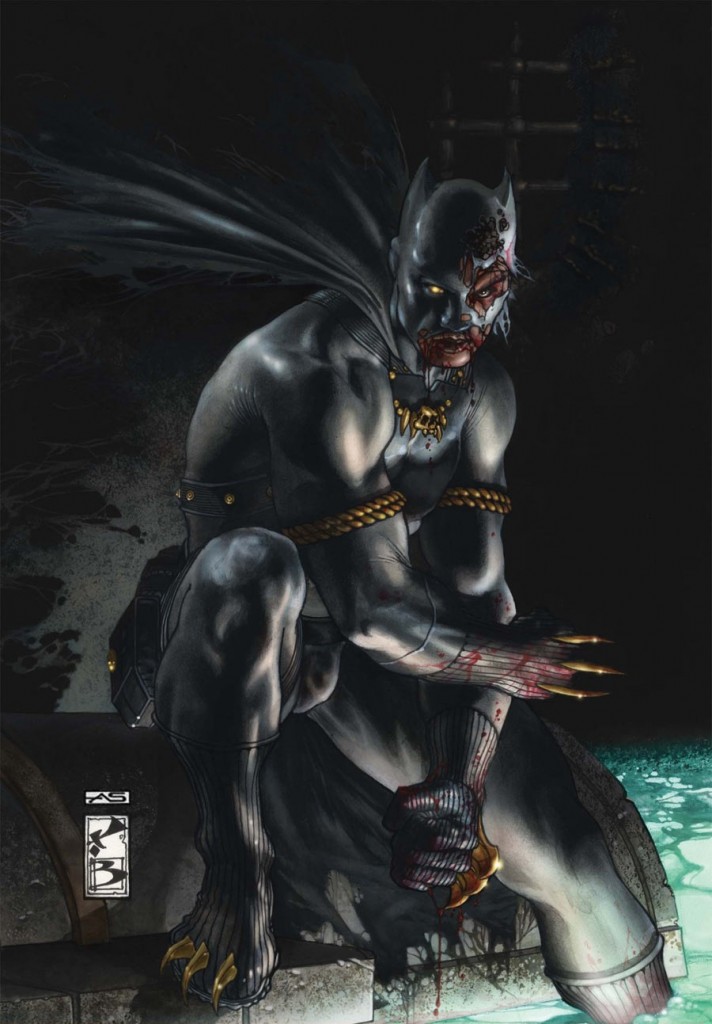
CA: Any closing words about your upcoming run on Black Panther: The Man Without Fear?
DL: Just that I’m incredibly happy to have an opportunity to work on this book. This is gritty, street-level, noirish stuff about very human characters facing hard choice. I set out to write a book that would be suspenseful and exciting, one in which characters have a lot at stake and in which the outcome is uncertain. In other words, I wanted to write a comic that would do what the best Daredevil comics did. Our artist, Francesco Francavilla, makes the book look amazing, and he’s a pleasure to work with. I hope readers will check it out because everyone on this team is a genuine fan and we’re all trying to make the kind of book we’d love to read.
I’d like to thank David again for his time, and remember, Black Panther: The Man Without Fear will hit shelves this Wednesday!
Infinite Speech
infinitespeech@comicattack.net

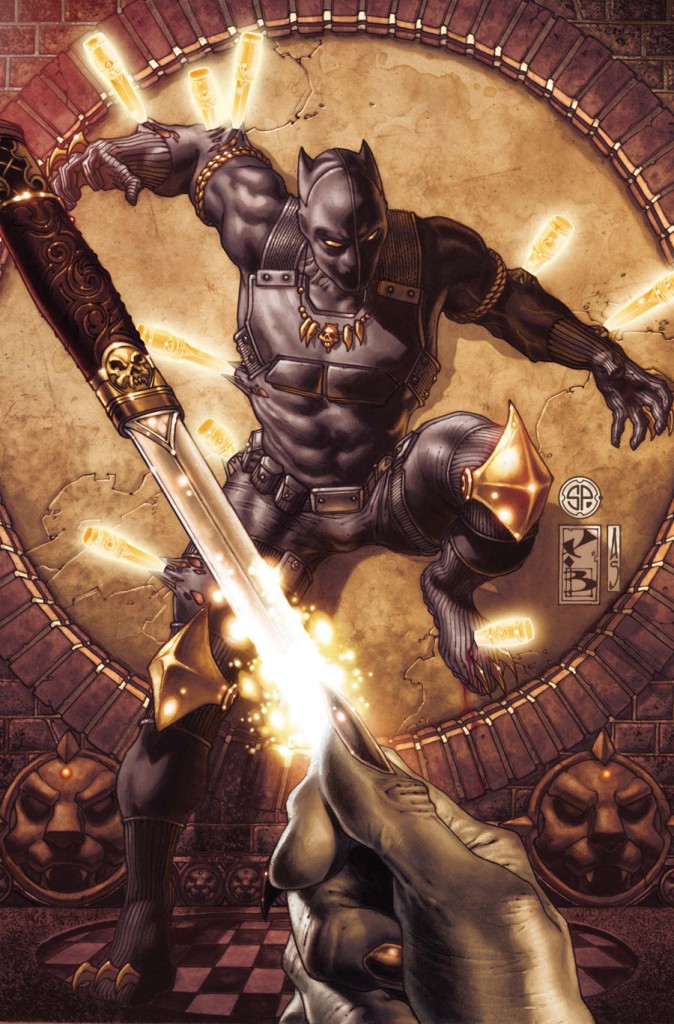
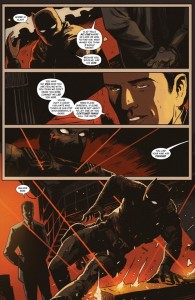
Pingback: Black Panther: The Man Without Fear or The Man Without a Title?
Pingback: Tweets that mention David Liss Speaks on Black Panther: The Man Without Fear! -- Topsy.com
Pingback: Chirpin’ Tuesday Reviews 12/8/10
Its certainly going to be interesting to see if this book makes it. I thought Marvel would put an established guy on this one, at least in the beginning. I like Black Panther but this book is going to be a tough one to pull off.
Liss is “established” he’s just crossing over to writing comics but I think I know what you’re saying Billy. A Black Panther book of any kind is always a hard sell for Marvel regardless of who writes it if you ask me.
Pingback: Marvel Reviews: Black Panther: The Most Dangerous Man Alive #529
Pingback: Top 10 Black Comic Book Characters of All Time!